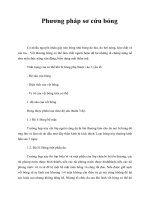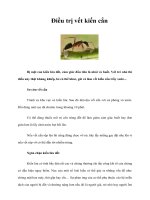Tài liệu Why Things Matter to People doc
Bạn đang xem bản rút gọn của tài liệu. Xem và tải ngay bản đầy đủ của tài liệu tại đây (1.84 MB, 296 trang )
This page intentionally left blank
Why Things Matter to People
Andrew Sayer undertakes a fundamental critique of social science’sdiffi-
culties in acknowledging that people’s relation to the world is one of
concern. As sentient beings, capable of flourishing and suffering, and
particularly vulnerable to how others treat us, our view of the world is
substantially evaluativ e. Yet modernist way s of thinking encourage the
common but extraordinary belief that values are beyond reason, and
merely subjective or matters of convention, with little or nothing to do
with the kind of beings people are, the quality of their social relations,
their material circumstances, or well-being. The au thor shows how social
theory and philosophy need to change to reflect the co mplexity o f every-
day ethical concerns and the importance people attach to dignity. He
argues for a robustly critical social science that explains and evaluates
social life from the standpoint of human flourishing.
andrew sayer is Professor of Social Theory and Political Economy in
the Department of Sociology at Lancaster University. His most recent
publications include The Moral Significance of Class (2005) and Realism
and Social Science (2000).
Why Things Matter
to People
Social Science, Values and Ethical Life
andrew sayer
cambridge university press
Cambridge, New York, Melbourne, Madrid, Cape Town, Singapore,
São Paulo, Delhi, Dubai, Tokyo, Mexico City
Cambridge University Press
The Edinburgh Building, Cambridge CB2 8RU, UK
Published in the United States of America by Cambridge University Press, New York
www.cambridge.org
Information on this title: www.cambridge.org/9780521171649
© Andrew Sayer 2011
This publication is in copyright. Subject to statutory exception
and to the provisions of relevant collective licensing agreements,
no reproduction of any part may take place without the written
permission of Cambridge University Press.
First published 2011
Printed in the United Kingdom at the University Press, Cambridge
A catalogue record for this publication is available from the British Library
Library of Congress Cataloguing in Publication data
Sayer, R. Andrew.
Why things matter to people : social science, values and ethical life / Andrew Sayer.
p. cm.
ISBN 978-1-107-00114-5 (hardback)
1. Social values. 2. Social norms. 3. Values. 4. Normativity (Ethics) 5. Social
sciences – Moral and ethical aspects. I. Title.
HM681.S29 2011
303.3
0
7201–dc22
2010038774
ISBN 978-1-107-00114-5 Hardback
ISBN 978-0-521-17164-9 Paperback
Cambridge University Press has no responsibility for the persistence or
accuracy of URLs for external or third-party internet websites referred to
in this publication, and does not guarantee that any content on such
websites is, or will remain, accurate or appropriate.
Some discouragement, some faintness of heart at the new real future which
replaces the imaginary, is not unusual, and we do not expect to be deeply
moved by what is not unusual. That element of tragedy which lies in the
very fact of frequency, has not yet wrought itself into the coarse emotion
of mankind; and perhaps our frames could hardly bear much of it. If we
had a keen vision and feeling of all ordinary human life, it would be like
hearing the grass grow and the squirrel’s heartbeat, and we should die of
that roar which lies on the other side of silence. As it is, the quickest of us
walk about well wadded with stupidity.
(George Eliot, Middlemarch)
We feel that even when all possible scientific questions have been answered,
the problems of life remain completely untouched.
(Wittgenstein, 1922, Tractatus Logico-Philosophicus )
Contents
Acknow ledgem ents page viii
1 Introd uction: a relat ion to the world of concern 1
2 Val ues within reason 23
3 Reas on beyo nd ratio nality: values an d practical reason 59
4 Bein gs fo r whom things matter 98
5 Under standi ng the ethica l dimension of lif e 143
6 Dig nity 189
7 Criti cal social scienc e and its rati onales 216
8 Impl ication s for social scienc e 246
Append ix: Com ments on philos ophical theories of ethics 253
Referen ces 264
Index 279
vii
Acknowledgements
I am indebted to the Economic and Social Research Council (ESRC) for
the fellowship I held in 2004–5 on ethics and social theory, which
allowed me to pursue this research.
Many people have helped me in various ways. I am indebted to the
graduate students at Lancaster University who took ‘Contemporary
Debates in Sociolo gy’ over the last five years with me, and who had to
endure earlier versions of some of the contents of this book. I’d also like
to record my appreciation of Lancaster Sociology Department’s excel-
lent support staff team of Claire O’Donnell, Jules Knight, Ruth Love,
Karen Gammon and Cath Gort on.
There are many friends and colleagues I’d like to thank for their
support, feedback, guidance, inspiration and beneficial distraction:
John Allen, Margaret Archer, Pat Batteson, Ted Benton, Sharon
Bolton, Keith Breen, Gideon Calder, Eric and Cecilia Clark, Norman
Fairclough and Isabela Ietcu-Fairclough, Steve and Anne Fleetwood,
Bernhard Forchtner, Anne-Marie Fortier, Bridget Graham and Tom
Fairclough, Costis Hadjimichalis and Dina Vaiou, Frank Hansen and
Helle Fischer, Iain Hunter and Sue Halsam, Bob Jessop, Russell Keat,
Richard Light, Kathleen Lynch, Dimitri Mader, Marie Moran, Kevin
Morgan, Caroline New, Phil O’Hanlon, Betsy Olson, Diane Reay, Bev
Skeggs, Eeva Sointu, Sylvia Walby, Dick Walker, Ruth Wodak, Erik
Olin Wright, Jill Yeung, Karin Zotzmann, and friends in the Over the
Hill walking club. Special thanks to my good friend Linda Woodhead,
fellow member of the Lancaster Neo-Aristotelian Dining Club, who
commented both critically and encouragingly on much of the book and
helped me think more clearly, and likewise to John O’Neill (once again)
for his invaluable advice on philosophical matters.
For music therapy I would like to record my thanks to Celso Fonseca,
Gillian Welch, David Rawlings, Nitin Sawhney, Per Kindgren, and the
late Thomas Tallis and Roberto Baden-Powell; more locally and
viii
actively, my thanks and appreciation to Richard Light, Iain Hunter,
Rick Middleton, Sam King, and the Lancaster Millennium Choir.
Finally, I would like to thank my daughter Lizzie for making me feel a
very fortunate Dad; and to Liz Thomas, my love and thanks for her
warmth and wisdom, and for spreading well-being around.
Acknowledgements ix
1 Introduction: a relation to
the world of concern
This book is about social science’s difficulties in acknowledging that
people’s relation to the world is one of concern. When we ask a friend
how they are, they might reply in any number of ways; for example:
‘I’m OK, thanks: my daughter’s enjoying school, things are good at home and
we’ve just had a great holiday.’
‘Not so good: the boss is always in a bad mood and I’m worried about losing
my job.’
‘OK myself but I’m really appalled by what’s been happening in the war.’
‘I’m a bit depressed: I don’t know where my life is going.’
Such responses indicate that things matter to people, and make a differ-
ence to ‘how they are’. Their lives can go well or badly, and their sense
of well-being depends at least in part on how these other things that
they care about – significant others, practices, objects, political causes –
are faring, and on how others are treating them. In some respects the
answers are very subjective and personal, yet they are not just free-
floating ‘values’ or expressions projected onto the world but feelings
about various events and circumstances that aren’tmerelysubjective.
They reflect the fact that we are social beings – dependent on others
and necessarily involved in social practices. They also remind us that
we are sentient, evaluative beings:wedon’t just think and interact but
evaluate things, including the past and the future (Archer, 2000a). We
do so because, while we are capable and can flourish, we are also
vulnerable and susceptible to various kinds of loss or harm; we can suffer.
The most important questions people tend to face in their everyday
lives are normative ones of what is good or bad about what is happe-
ning, including how others are treating them, and of how to act, and
what to do for the best. The presence of this concern may be evident
in fleeting encounters and mundane conversations, in feelings about
how things are going, as well as in momentous decisions such as
1
whether to have children, change job, or what to do about a relationship
which has gone bad. These are things people care deeply about. They
are matters of ‘practical reason’, about how to act, and quite different
from the empirical and theoretical questions asked by social science.
If we ignore them or reduce them to an effect of norms, discourse or
socialization, or to ‘affect’, we produce an anodyne account of living
that renders our evident concern about what we do and what happens
to us incomprehensible.
When someone says ‘my friends mean a lot to me’, they are indicating
what matters to them, what has import. When an immigrant says ‘let me
tell you what it means to be an immigrant’ she is not about to give a
definition but to indicate how being an immigrant affects one’s well-
being, what one can and can’t do, how one is treated by others, and what
it feels like. All of these everyday expressions show that we are beings
whose relation to the world is one of concern. Yet social science often
ignores this relation and hence fails to acknowledge what is most impor-
tant to people. Concepts such as ‘preferences’, ‘self-interest’ or ‘values’
fail to do justice to such matters, particularly with regard to their social
character and connection to events and social relations, and their emo-
tional force. Similarly, concepts such as convention, habit, discourses,
socialization, reciprocity, exchange, discipline, power and a host of
others are useful for external description but can easily allow us to
miss people’s first person evaluative relation to the world and the force
of their evaluations. When social science disregards this concern, as if
it were merely an incidental, subjective accompaniment to what hap-
pens, it can produce an alienated and alienating view of social life. It
needs to attend to our evaluative orientation, or to ‘lay normativity’,
though that is a rather alienated way of describing it.
In his book Culture and Truth, Renato Rosaldo writes about his
early work studying headhunting among the Ilongot people of north-
ern Luzon, in the Philippines (Rosaldo, 1989). When he asked head-
hunters why they did it, they told him that ‘rage, born of grief’,
impelled them to do it. Of one he says, ‘The act of severing and tossing
away the victim’s head enables him, he says, to vent and, he hopes,
throw away the anger of his bereavement’ (ibid., p. 1). Rosaldo reveals
that it took him fourteen years to understand this explanation, during
which time his informants rejected his own proffered explanations,
including one that interpreted headhunting in terms of transactions
theory. What finally enabled him to understand it was the accidental
2 Why Things Matter to People
death of his wife and fellow anthropologist Michelle Rosaldo, who
slipped and fell from a mountain path while on field research.
Overwhelmed with grief and anger, and remembering the death of his
brother years earlier, only then did he begin to understand headhunting
and its relation to grief. Rosaldo goes on to note how anthropologists
writing about the ways in which cultures deal with death did so ‘under
the rubric of ritual rather than bereavement’, so that the emotional
force of the experience – the thing that matters most to the people
themselves – was edited out. In contrast, Rosaldo argues that ‘cultural
descriptions should seek out force’ (ibid., p. 16). I agree; indeed, not
to do so is to misunderstand social life.
The aim of this book is to help social science do justice to this
relation of concern, to lay normativity, and to the fact that we are
sentient beings who can flourish or suffer. To do so we need to clear
away a number of obstacles and develop more fruitful frameworks.
One of the most important obstacles is the view that values are merely
subjective or conventional, beyond the scope of reason – not suscep-
tible to evidence or argument – and have nothing to do with the kind
of beings that we are, or with what happens.
Imagine three friends sitting watching the television news together.
Two of them are social scientists. Some disturbing footage is shown of
survivors in a village which has just been bombed; people are standing
in the ruins of their own homes, having just come to realize that their
loved ones have been killed. They are wailing and screaming – beside
themselves with grief. The non-social scientist says, ‘I can’t imagine
anything more appalling than that. They have lost everything. How
terrible.’ One of the social scientists responds, ‘Well, yes, but that’s
just a value-judgement.’ The other says, ‘Well, according to the norms
of our society, it ’s bad; but we must remember values come from the
norms of a society. We say these things are terrible not because they
are, but rather we think they’re bad because our social norms say they
are.’ The first viewer is outraged: ‘No, it’s not just my value-judgement.
It’s a fact that they are going through appalling suffering – it’s as real
as the rubble they’re standing in. They really have lost everything.
They will be traum atized for the rest of their lives, regardless of what
their norms are. How can it not be bad?’
This, of course, is an invented example, and you might say an unrea-
listic one, for it’
s unlikely that social scientists would actually say such
bizarre things in such a context. But many do make such assumptions
Introduction: a relation to the world of concern 3
when practising their social science, and I invented the example to
point to their absurdity. The non-social scientist is s aying that her
judgement is not arbitrary or mer ely subjective but reasonable in
relation to what i t’s about –‘real suffering’,shemightsay– and she
provides reasons and evidence for her judgement. In effect, while she
highlights the deeply evaluative character of human experience, and its
relation to human vulnerability, her social scientist friends bracket
these out, leaving mere values or norms, ‘subjective’ and strangely
detached from their objects, the things they are about, so that they
appear to lack justification.
The view of values as beyond reason is part of a whole series of
flawed conceptual distinctions that obstruct our understanding of
the evaluative character of everyday life: distinctions such as fact and
value, is and ought, reason and emotion, science and ethics, positive
and normative, objective and subjective, body and mind, animal and
human. Each term conceals internal distinctions that may be impor-
tant, such as the different kinds of reason, and while the terms in the
pairs are different they are not simply opposed and mutually exclusive,
but sometimes overlapping, so that for example there is emotional
reason. The distinction between is and ought, that has dominated
thinking about values in social science, allows us to overlook the
missing middle, the centrality of evaluation. It obscures the nature of
our condition as needy, vulnerable beings, s uspended between things
as they are and as they might become, for better or worse, and as we
need or want them to become. A lthough many social theorists, parti-
cularly feminists, have attacked a nd deconstructed these distinctions,
I shall argue that the deconstruction is far from complete, so that
they still hold sway, even over some who claim to reject them. While
I believe that values, feelings and emotions need to be taken more
seriously in social science, I have no truck with a romanticism that
attempts to deflate reason or rationality. Rather I argue that, properly
understood, reason is involved with all these things.
The first part of the book provides a constructive critique of this
framework of concepts. They are not merely questionable academic
ways of thinking, but have become fundamental to the organization
and self-understanding of modern life. The division between positive
and normative thought has become institutionalized with the emer-
gence of the academic division of labour, and the estrangement of social
science, dealing with description and explanation, from philosophy and
4 Why Things Matter to People
political theory, dealing with normative thinking. I shall attempt to
mediate between them by matching their complementary strengths and
weaknesses, addressing social science’s understanding of social influences
on individuals, to philosophy’s undersocialized view of individuals, and
addressing philosophy’s understanding of reason and normative argu-
ments, to social science’s often oversocialized view of individual action.
Another obstacle to understanding lay normativity is the tendency
to overlook our sentient nature – not only in the sense of beings who
feel things, but who can suffer or flourish in various ways. We can be
well-fed or malnourished, healthy or sick, respected or despised and
humiliated, powerful or powerless, supported or exploited, and loved
or unloved; we can have a sense of self-worth or worthlessness, be
stimulated or bored, happy or depressed, and so on. Hence our con-
cerns. Concepts of human agency emphasize the capacity to do things,
but our vulnerability is as important as our capacities; indeed the two
sides are closely related, for vulnerability can prompt us to act or fail
to act, and both can be risky. Capacity and vulnerability are always in
relation to various circumstances, whether passing events or enduring
conditions. We might say people sometimes value the things they care
about more than themselves, but then those concerns have become a
part of them rather than something separable. While attachments and
commitments can bring meaning, interest, satisfaction and fulfilment
to people’s lives, in becoming dependent on them they become vulner-
able to their loss or damage, and hence suffer. Given all these possibi-
lities for different kinds of flourishing and suffering it is not surprising
that we are beings for whom things matter.
Do we flourish or suffer and value things in various ways because
of our nature, or because of the understandings and conventions of
our culture that we have learned? Sociology a nd anthropology lean
towards the latter answer, and are often extremely wary of any invo-
cations of ‘human nature’; and for good reason, as we are cultural
beings, albeit ones who can easily mistake our cultural specificity for
some general human nature. But not everything is capable of cultural
variation – you can’t teach a stone or insect a language or acculturize
it, and it can’t f eel F rench or Muslim – so we must have the kind of
nature that is capable of cultural variation. The problem is that human
nature and culture are so complexly related that to give a sensible
answer we have to get beyond a simple relation of opposition and
deconstruct the concepts; we could talk about ‘differently cultivated
Introduction: a relation to the world of concern 5
natures’, for instance. But if we simply opt for either nature or c ulture – for
either biological or cultural reductionism – then we won’t understand how
we flourish or suffer. Th ese are complex matters that we have to explore if
we are to understand our relation to the world of concern. What is it about
us that makes us like this?
It is in the context of capability, vulnerability and precarious well-
being or flourishing, and our tendency to form attachments and com-
mitments, that both values and reason in everyday life need to be
understood. Social science’s favoured spectator’s view of action,
coupled with its wariness of normative or evaluative discourse, can
easily prevent it from understanding what is most important to people.
It seems that becoming a social scientist involves learning to adopt
this distanced relation to social life, perhaps so as to be more objective,
as if we could become more objective by ignoring part of the object. It
therefore often tends to produce bland accounts of social life, in which
it is difficult to assess the import of things for people. One might of
course try to report people’s feelings about how their life is going as
social facts about them, but that can easily allow them to be treated
as values beyond reason, as merely subjective or conventional, by deta-
ching their concerns from what they are about, thereby failing to treat
them as evaluative judgements about things. We could just report that
some group claims to feel happy or oppressed, but we are also likely
to want to know whether their claims are warranted, and this involves
an assessment of flourishing and suffering, not merely as subjective
judgements but as actual ways of being. Pe ople often try to make the
best of what they have and to value this rather than feel resentful about
what they lack; they may have what economists call ‘adaptive prefer-
ences’. But we cannot acknowledge such possibilities without evalu-
ating their judgements.
There are obvious difficulties and dangers in making such evaluative
judgements, particularly if researchers misunderstand what the others’
situation is like from the inside, ignoring the meaning that their way of
life has for them, as in ethnocentrism. Clearly, social scientists should
seek to understand this, but to understand someone is not necessarily to
agree with them. When feminist researchers argue that women are
oppressed, even sometimes where they deny it, or that misogynists
misrepresent women, they are adopting a critical relat ion to the ideas
and practi ces of those they study, yet it doesn’t necessarily mean that
they misunderstand such people. Nor doe s such a critical relation imply
6 Why Things Matter to People
or provide a warrant for paternalistic, illiberal intervention: people still
have the right to decide for themselves how to live. Rather it opens up a
space for public discussion of what constitutes well-being.
Sometimes the only way we can adequately describe social phenomena
is through evaluative descriptions: to describe actions as ‘compassionate’,
‘ab usive’ or ‘racist’ is also to evaluate th em. It may not be possible to find
value-free terms for those actions with out turning the descriptio ns into mis-
descriptions; the scene of the bombed-out village might be described as
‘co llateral damage’,butthatwouldalsofailtodescribetheenormityof
what happened. Values and objectivity need not be inversely related. For
many social scientists, assessing well-being is a step too far, a dangerous
importation of the researcher’s own values. But well-being and ill-being are
indeed states of being, not merely subjective value-judgements. As the lay
television viewer said, the bombed-out villagers really were suffering. The
very assumption that judgements of value and objectivity don’tmix– an
assumption that is sometimes built into the definition of ‘objectivity’–is a
misconception.
People’s concerns cover a wide range of things, from health, to
relationships, work, the arts, politics, religion, sport and many others.
Within the general theme of lay normativity, I shall focus on ethical or
moral matt ers, by which I mean, roughly, issues of how people behave
or should behave in relation to others, with respect to their well-being.
These are particularly important because the quality of people’s lives
depends hugely on the quality of the social relations in which they live,
and on how people treat one another. We continually monitor both
our own behaviour and that of others, particularly towards ourselves,
and those we care about. Our relation to self is strongly influenced
by our relations to others; it is hard to have self-esteem if no-one else
esteems us, and we can hardly avoid assessing ourselves by reference
to shared standards and comparisons with others. To be sure, the social
structures and norms in which we live shape how we behave towards
one another, and provide positions from which we interact, strongly
influencing what we can do and the kind of people we become, but
they do not fully determine actions. Social structu res and rules them-
selves can institutionalize moral norms about entitlements, responsibi-
lities and appropriate behaviour; as such they can still be the object of
ethical evaluation, whether in everyday life or academic commentaries;
are they fair, empowering, democratic, oppressive, conducive to respe-
ctful treatment of others, friendliness or selfishness?
Introduction: a relation to the world of concern 7
Although this ethical dimension of life matters enormously to us,
social science is often poor at acknowledging and understanding it, pre-
ferring to account for action in terms of self-interest, or norm-following,
or habitual action, or discursive constitution, which comprehensively
fail to deal with the quality of ethical sensibilities. In so doing we
may find it hard to recognize our own concerns as people, though in
becoming a social scientist one can get socialized into not noticing
this, and come to regard oneself as a spectator and not also a partici-
pant. This can cause theory–practice contradictions: in everyday life
a sociologist who was mistreated by someone would probably feel
that the wrong consists in having been harmed in some way, but as
a social scientist they might gloss this merely as a transgression of
norms, or difference in subjective values. Philosophy takes great inte-
rest in ethics, but mainly as regards what an ideal, rational morality
would be like, rather than actual everyday ethical and unethical beha-
viour. It tends to value reason and discourse over emotion, dispositions
and the body, and to focus on individuals as rational, autonomous actors
in abstraction from the social circumstances that influence who they are
and how they think and act.
As we shall see the connection of ethics or morality to well-being is
vital. There are limits to the extent to which we can rationalize or wish
away harm, and fabricate a sense of well-being. How people can best
live together is not merely a matter of coordination of the actions of
different indivi duals by means of con ventions, like deciding which side
of the road to drive on, but a matter of considering people’s capacities
for flourishing and susceptibilities to harm and suffering. When we
think about how to act, we do so with some awareness of the implica-
tions for well-being – both ours and that of others. It’s hard to define
well-being but, while there are many aspects of it that we’re unsure of,
there are also many that are rather obvious – for examp le, we know
that children need care, that disrespect, abuse and violence are harmful,
and that homelessness is bad. When we ask people how they are, they
usually have no trouble telling us, but they would probably be stumped
by abstract questions like ‘What is well-being or flourishing?’ Of course,
ideas of ‘the good’, as philosophers call it, will vary culturally, but all
cultures provide some notion of this, and indeed, of what is good or
appropriate behaviour and what is a good or bad person. Given the
importance of these matters to people, one might expect social science
to have a better idea of what ‘well-being’ and so on mean. How could
8 Why Things Matter to People
it claim to understand society if it had no idea about what it might
mean to flourish? However, on the whole it tends to be extremely coy
about such questions, perhaps because it is feared that answering them
would invite researchers to impose their own value-judgements or
‘conceptions of the good’ on those they study.
A minority of social science does address our relation to the world of
concern and help us understand why things matter. Here is a male,
Algerian migrant worker in France, quoted in Abdelmayak Sayad’s
book The Suffering of the Immigrant:
What kind of li fe is it when, in order to feed your childr en, you are forced to
leave them ; when, in order to ‘fill’ your hous e, you start by deserting it, when
you are the first to a bandon your country in order to work it? Their
country is back there, th eir house is back there, their wives and children are
back there, everything is back there, only their bodies are here [in France],
and you call that ‘living’ Who are these peop le? Men, but men without
women: their wives are without men, but they’re not widows because their
husbands are alive; their children are without fathers, orphans even though
their fathers are alive I ask myself who are the real widowers, th e real
orphans – is it them [the emig rant men], or is it their wives? (Sayad, 2004,
p. 59, parentheses in original)
Sayad includes extensive quotations from interviews with immigrants in
which they describe such feelings. He doesn’t merely report their views as
social facts about them but takes them seriously as evaluations of their
experience, as indicators of the precise ways in which they have suffered,
and as sources of insight into their objective situation.
Richard Sennett and Jonathan Cobb’s The Hidden Injuries of Class
gives us insights into why class inequalities matter in relation to indivi-
duals’ well-being (Sennett and Cobb, 1973; see also Charlesworth, 2000).
Some more recent feminist writing on gender, class and race explores the
kinds of suffering and repression engendered by these forms of inequality,
and how people value themselves and others (hooks, 2000;Reay,2002;
Skeggs, 1997, 2004).
1
More generally there is a large feminist literature,
which, in effect, shows the many forms of suffering and restricted flour-
ishing to which women are subject (e.g., Bartky, 1990, 2002;Steedman,
1986). Significantly, these authors deal not only with the micro-politics
of inequality and what Bourdieu terms ‘soft domination’, but with
1
This is also what I tried to do in my Moral Significance of Class (Sayer, 2005).
Introduction: a relation to the world of concern 9
people’s well-being and their evaluative orientation to the world,
particularly through their relations to others (Bourdieu, 1990). For
example, in her book Personal Life, Carol Smart attempts to do justice
to how lives are lived and notes that, while there is a signifi cant
literature on emotions in sociology, much of sociology ignores the
topic, and either steers clear of dealing with emotions in everyday
life, or deals with them in a distanced way. In particular, it deals
with love in a ‘disdainful’ manner, as a frivolous matter associated
with women’s magazines and trivia (Smart, 2007). As she puts it, the
‘seriousness of sociology as a discipline seems to become compromised
if it gets too close to the taken-for- granted stuff of everyday life’
(pp. 58–9). Rather than get close to things that matter very much to
people – things w hich involve vulnerability and powerful feelings – it is
tempting to remain loftily aloof. It is significant that this other, min-
ority literature has in common a recognition not only of people’s
capacities but of their vulnerabilities, and it takes their first-person
view of the world seriously, both recognizing their agency and what
their concerns tell us about them and t heir situation.
While our evaluat ive relation to the world in society itself is the main
subject of this book, the role of evaluation and values within social
science is a minor theme. My point regarding the latter is not the banal
one that social scienc e is unavoidably value-laden; of course it is.
Rather it is to support the fictional lay television viewer and argue
that values in life generally are within the scope of reason. Moreover,
without careful evaluative descriptions, that, for example, identify the
presence of various kinds of suffering and flourishing, social science
cannot develop adequate accounts of social life. While I am primarily
concerned with the evaluative character of everyday experience itself
and how we can best understand it, and only secondarily with values
within social science, there ought to be consistency between the way
valuation and values are understood in each.
From taking part in seminars and workshops on values and social
research I have often encountered the strange idea that values are not
only subjective but synonymous with ‘bias’ and distortion. It’s further
assumed that they are personal biases that one ideally shou ld confess
to, so that others will at least be able to ‘take them into account’, that
is, discount them. This is self-deprecating insofar as it invites the reader to
discount what may be reasonable evaluative judgements. Tactically, it’s
disastrous since it invites readers with different values to ignore them. It
10 Why Things Matter to People
implies that values are no more than subjective afflictions having nothing
to do with what is being valued. In addition, values are often seen as private
and inviolable –‘my personal values’–and not to be assessed by others.
Because they a ssume that values are beyond the scope of reason, some
social scientists try to avoid value-judgements in their accounts of social
life, believing that this is necessary to ensure objectivity. As Weber put it,
‘Whenever the person of science introduces his personal value judgment, a
full understanding of the facts ceases’ (Weber, 1946,p.146).Othersargue
the reverse, that values are inevitable in social science, so we cannot expect
to be objective. Although these two positions are diametrically opposed,
they are completely agreed on one thing: that objectivity and values
are incompatible. I disagree with both positions. Each is trapped within
the framework of problematic distinctions that prevent us from under-
standing normativity. If values are within the scope of reason, they need
not be regarded as a contaminant in social science itself.
Critical theory and critical social science fully a cknowledge their evalua-
tive relation to their subject matter, being critical not only of other aca-
demic theories but of social practices themselves. However, they have
struggled to justify the critiques that they have developed. I shall argue
that this is because they lack an adequa te account of human capacities and
vulnerabilities, generally through an exaggerated fear of ethnocentrism or
other kinds of misjudgement of social life. As a result, their critiques have
become more cautious, and retreated into an inward-looking reflexivity.
Us or them?
Social scientists tend to address their readers more as fellow spectators
of social life than as possible co-participants. They generally offer third
person accounts of what other people or ‘actors’ do and are like, how
society is organized and how it works, and so on. Readers are not
usually invited to check the accounts against their own experience and
ways of thinking, although of course they may do so anyway. The
validity of a social scientific account of some social group’ s behaviour
simply doesn’t depend on how it squares with the reader’s behaviour.
Social scientists do not generally evaluate the thinking of those they
study and hold them responsi ble for their thoughts and actions; they
just report it. Philosophers, on the other hand, tend to address their
readers as fellow participants in life, in first or second person mode;
Introduction: a relation to the world of concern 11
when discussing examples of actions, particularly moral actions, they
refer to what ‘we’ or ‘one’ would do or ought to do. If they refer to ‘what
a rational person would do’, readers are implicitly invited to identify
with such a person and to check such claims by reference to their own
behaviour. When philosophers refer to an example of someone’s beha-
viour, the reader is usually expected to assess it in terms of whether it
was justified.
As participants in social life, we hold each other responsible for our
actions; in organizations, for example, individuals expect each other
to take responsibility for doing certain things and we generally try to
make things go well – sometimes just for ourselves, sometimes for
others too. We are concerned about our well-being, and the worth of
what we and they are doing. As social scientists observing others,
however, our prime aim is to find out what they do and why. Unless it
affects our research process, we don’t have to worry about whether we
approve or disapprove of their actions, or whether they will honour
their responsibilities. Even in so-called ‘participant observation’, the
goal is still observation; the point is still to observe how others live.
When we study an organization we hope we will be given plenty of
access so that we can observe people freely and find out as much as
possible. When we go to work for an organization, we worry about
how we will be treated, whether it will be friendly, democratic and fair,
or hostile, authoritarian and oppressive. As co-participants, the quality
of our experience – including our relations to others – matters much
more to us. The danger is that, because, as social scientists, we mostly
want to observe and explain what people do rather than cooperate
with them in some practice, we will project that spectator’s relationship
onto them, and fail to appreciate the import of the practices for them,
so that they appear as unfeeling actors of parts, bearers of roles, occu-
pants of subject positions, mere causal agents. But in everyday life,
when a friend tells us about what’s been happening, say at work, we
are general ly expected to evaluate it in some way and see it in terms of
some wider picture of their and our concerns (‘wasn’t what the boss
said outrageous?’). If we can’t see any such connection we might won-
der why they’re telling us about it.
If I write ‘people’s judgements of what is good or bad depend on the
social norms of their community’ it may seem a broadly acceptable
social scientific proposition. If I ask you, dear reader, if all your judge-
ments of people and practices as good or bad depend simply on the
12 Why Things Matter to People
social norms of your community, then you will probably say no. It is
likely to seem not only wrong but offensive, for it suggests you merely
believe what others have told you to believe. In other words, the third
person, spectator mode tends to allow not only a distanced relation-
ship to those under study but a demeaning one, because it leaves no
room for the life of the mind, for personal decision and responsibility.
This situation generates contradictions betwe en what social scien-
tists say in their theory and what they do in their practice. As social
scientific spectators we tend to talk about behaviour in terms of what
explains it, usually by reference to existing circumstances and mean-
ings, but as participants, we tend to justify what we do, and implicitly
invite others to accept or rejec t our justification. As researchers, socio-
logists might explain students’ performance by refer ence to their social
background, but in their practice as teachers they tend to hold students
responsible for their performance.
It would of course be problematic if social science always tried to
reconcile our third person, spectat ors’ accounts of the thought and
action of others with our first person, participants’ accounts, for others
may actually be different from us. But even where this is the case, they
still think and have concerns. Like us, they are evaluative beings and
things matter to them; they don’t just go through the motions or act out
parts. To avoid theory–practi ce contradictions, we need to check that
the way we account for others’ behaviour is not at odds with the way we
account for our own behaviour. If there are differences in these
accounts, they should reflect actual differences in behaviour; they
should not merely be artefacts of social scientists’ reluctance to
acknowledge people’sreflexivity, agency and concern. In order to
encourage readers to think about social life from the inside, as partici-
pants and agents, as well as from the outside, as spectators, I shall, at the
risk of a little grammatical clumsiness, regularly switch back and forth
between referring to us and them, and we and they.
Some further things to bear in mind
(1) As a social scientist myself, I am writing this book to or for fellow
social scientists, but the issues are mostly conceptual, and many of the
authors I shall draw upon are philosophers. Some of the terms and
concepts I shall use may consequently be unfamiliar to social scien-
tists; no doubt ‘flourishing’ and ‘virtues and vices’ will seem not only
Introduction: a relation to the world of concern 13









